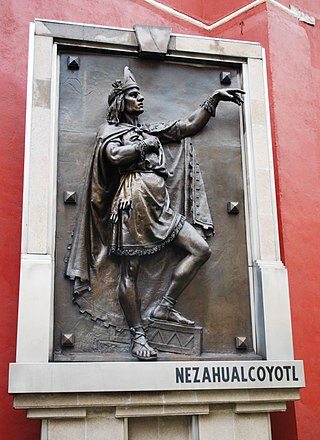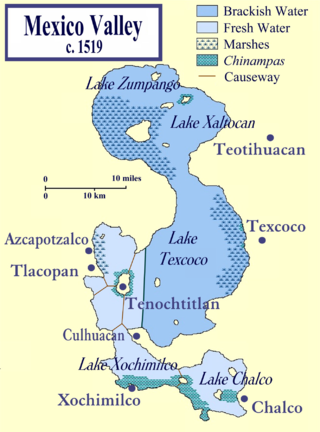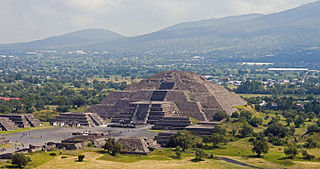Related Research Articles

Axayacatl was the sixth tlatoani of the altepetl of Tenochtitlan and Emperor of the Aztec Triple Alliance.

Aztec mythology is the body or collection of myths of the Aztec civilization of Central Mexico. The Aztecs were Nahuatl-speaking groups living in central Mexico and much of their mythology is similar to that of other Mesoamerican cultures. According to legend, the various groups who were to become the Aztecs arrived from the north into the Anahuac valley around Lake Texcoco. The location of this valley and lake of destination is clear – it is the heart of modern Mexico City – but little can be known with certainty about the origin of the Aztec. There are different accounts of their origin. In the myth the ancestors of the Mexica/Aztec came from a place in the north called Aztlan, the last of seven nahuatlacas to make the journey southward, hence their name "Azteca." Other accounts cite their origin in Chicomoztoc, "the place of the seven caves," or at Tamoanchan.

Nezahualcoyotl was a scholar, philosopher (tlamatini), warrior, architect, poet and ruler (tlatoani) of the city-state of Texcoco in pre-Columbian era Mexico. Unlike other high-profile Mexican figures from the century preceding Spanish conquest of the Aztec Empire, Nezahualcoyotl was not fully Mexica; his father's people were the Acolhua, another Nahuan people settled in the eastern part of the Valley of Mexico, on the coast of Lake Texcoco. His mother, however, was the sister of Chimalpopoca, the Mexica king of Tenochtitlan.

Nezahualpilli was king (tlatoani) of the Mesoamerican city-state of Texcoco, elected by the city's nobility after the death of his father, Nezahualcoyotl, in 1472. Nezahuapilli's mother was Azcalxochitzin, who married Nezahualcoyotl after the death of her first husband, King Cuahcuauhtzin of Tepechpan.

Itzcoatl (1380–1440) was the fourth king of Tenochtitlan, and the founder of the Aztec Empire, ruling from 1427 to 1440. Under Itzcoatl the Mexica of Tenochtitlan threw off the domination of the Tepanecs and established the Triple Alliance together with the other city-states Tetzcoco and Tlacopan.

Miguel León-Portilla was a Mexican anthropologist and historian, specializing in Aztec culture and literature of the pre-Columbian and colonial eras. Many of his works were translated to English and he was a well-recognized scholar internationally. In 2013, the Library of Congress of the United States bestowed on him the Living Legend Award.
Cuacuauhtzin was an Aztec poet, composing in the Nahuatl language, and lord of Tepechpan. Born around the year 1410, Cuacuauhtzin became lord when his father, Tencoyotzin died at a young age.

HuitzilihuitlNahuatl pronunciation: [wit͡siˈliwit͡ɬ](listen) or Huitzilihuitzin was the second Tlatoani or king of Tenochtitlan. According to the Codex Chimalpahin, he reigned from 1390 to 1415, according to the Codex Aubin, he reigned from 1396 to 1417 and according to the Codex Chimalpopoca, he reigned from 1403 to 1417.

Tlacopan, also called Tacuba, was a Tepanec / Mexica altepetl on the western shore of Lake Texcoco. The site is today the neighborhood of Tacuba, in Mexico City.

The Aztec Empire or the Triple Alliance was an alliance of three Nahua city-states: Mexico-Tenochtitlan, Tetzcoco, and Tlacopan. These three city-states ruled that area in and around the Valley of Mexico from 1428 until the combined forces of the Spanish conquistadores and their native allies who ruled under Hernán Cortés defeated them in 1521.

The Aztecs were a Pre-Columbian Mesoamerican people of central Mexico in the 14th, 15th, and 16th centuries. They called themselves Mēxihcah.
Xayacamach of Tizatlan was an Aztec poet from the Pre-Columbian state of Tlaxcallan, born between 1450 and 1455.

Xicotencatl I or Xicotencatl the Elder was a long-lived tlatoani (king) of Tizatlan, a Nahua altepetl within the pre-Columbian confederacy of Tlaxcala, in what is now Mexico.
The Cantares Mexicanos is the name given to a manuscript collection of Nahuatl songs or poems recorded in the 16th century. The 91 songs of the Cantares form the largest Nahuatl song collection, containing over half of all known traditional Nahuatl songs. It is currently located in the National Library of Mexico in Mexico City. A description is found in the census of prose manuscripts in the native tradition in the Handbook of Middle American Indians.
Tlaltecatzin was a poet from the city of Cuauhchinanco.
Temilotzin was born in Tlatelolco and ruled Tzilacatlan. He rose to the rank of Tlacatecatl during his military time. He was a friend of Cuauhtemoc. He fought against the conquistadors during the Conquest of the Aztec Empire at Cuauhtemoc's side. He was present at the moment when the Spanish were leaving Tenochtitlan during La Noche Triste. He was at Cuauhtemoc's side when the Mexica had to surrender. He was forcibly sent to expedition to Honduras along with Cuauhtemoc. According to Anales de Tlatelolco, Temilotzin witnessed Cuauhtemoc hung from a ceiba tree.
Chichicuepon, was lord of Chalco, Mexico, and also a poet. Only one of his poems has survived.
Tecayehuatzin (Aquiauhtzin) (1430-1500) was a Nahuatl noble poet born in Ayapango, Mexico. Although a sought-out composer of poetry, few of his poems survive.
Macuilxochitzin, also referred to in some texts as Macuilxochitl, was a poet (cuicanitl) during the peak years of the Aztec civilization. She was the daughter of Tlacaélael, a counselor to the Aztec kings and the niece of the Tlatoani warrior Axayacatl. She lived through the height of the Aztec civilization's expansion. Her life and works are an example of gender parallelism in pre-Hispanic Mexico, where women were given the same opportunities enjoyed by men.
References
- ↑ Miguel Léon-Portilla (1967). Trece poetas del mundo azteca[Thirteen Poets from the Aztec World] (in Spanish) (2nd 1978 ed.). Mexico City: Universidad Nacional Autonoma de Mexico. pp. 127–131.
- Leon-Portilla, Miguel (2000). Fifteen Poets of the Aztec World. Oklahoma: University of Oklahoma Press.